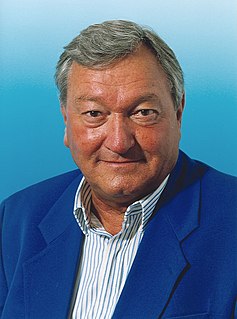A Quote by Erich von Däniken
If we want to set out on the aruous search for the truth, we must all summon up the courage to leave the lines along which we have thought until now and as the first step begin to doubt everything that we previously accepted as correct and true. Can we still afford to close our eyes and stop up our ears because new ideas are supposed to be heretical and absurd?
Related Quotes
I have no doubt in my mind that our chief national problems relating to the eradication of poverty, illiteracy and disease and the scientific production and distribution can be tackled only along socialistic lines.The Very first thing that our future national government will have to do is to set up a commission for drawing up a comprehensive plan for reconstruction.
If you're tired of getting additional information, you can just close your eyes, get some sleep. But earlids, covering of the ears, never evolved. Not once do we find it, even in the fossil records. Because while we let our eyes relax, our ears are still hearing. And that's why alarm clocks work and wake us up. We still gather information. Every animal is gathering information 24/7. So I like to think of acoustic ecologists as people who are trying to become better listeners, 24/7.
The truth about our childhood is stored up in our body, and although we can repress it, we can never alter it. Our intellect can be deceived, our feelings manipulated, and conceptions confused, and our body tricked with medication. But someday our body will present its bill, for it is as incorruptible as a child, who, still whole in spirit, will accept no compromises or excuses, and it will not stop tormenting us until we stop evading the truth.
There is truth in little corners of our lives. There are hints of it in songs and children's eyes. It's familiar, like an ancient lullaby; What do I live for? If we've eyes to see... If we've ears to hear... To find it in our hearts and mouths the word that saves is near. Shed that shallow skin... Come and live again... Leave all you were before... To believe is to begin.
We cannot begin with complete doubt. We must begin with all the prejudices which we actually have when we enter upon the study ofphilosophy. These prejudices are not to be dispelled by a maxim, for they are things which it does not occur to us can be questioned. A person may, it is true, in the course of his studies, find reason to doubt what he began by believing; but in that case he doubts because he has a positive reason for it, and not on account of the Cartesian maxim. Let us not pretend to doubt in philosophy what we do not doubt in our hearts.
i thank You God for most this amazing day:for the leaping greenly spirits of trees and a blue true dream of sky; and for everything which is natural which is infinite which is yes (i who have died am alive again today, and this is the sun's birthday; this is the birth day of life and of love and wings: and of the gay great happening illimitably earth) how should tasting touching hearing seeing breathing any--lifted from the no of all nothing--human merely being doubt unimaginable You? (now the ears of my ears awake and now the eyes of my eyes are opened)
What I want to argue for is not that we should give up on our ideas of success, but that we should make sure that they are our own. We should focus in on our ideas and make sure that we own them, that we're truly the authors of our own ambitions. Because it's bad enough not getting what you want, but it's even worse to have an idea of what it is you want and find out at the end of the journey that it isn't, in fact, what you wanted all along.
Fear keeps us focused on the past or worried about the future. If we can acknowledge our fear, we can realize that right now we are okay. Right now, today, we are still alive, and our bodies are working marvelously. Our eyes can still see the beautiful sky. Our ears can still hear the voices of our loved ones.
Every time we turn our heads the other way when we see the law flouted, when we tolerate what we know to be wrong, when we close our eyes and ears to the corrupt because we are too busy or too frightened, when we fail to speak up and speak out, we strike a blow against freedom and decency and justice.
Because I'm a "strong person," the symptoms hit me by surprise. It was, as I write in the book, stinging in my eyes after Sunday that I thought was an allergy, until one day I sat in the car and decided to just let my eyes tear up so that whatever was in them would come out, and what came out were tears that wouldn't stop. It was literally a physical reaction that was my first indication there was anything wrong.
No civilisation can grow unless fanatics, bloodshed, and brutality stop. No civilisation can begin to lift up its head until we look charitably upon one another; and the first step towards that much-needed charity is to look charitably and kindly upon the religious convictions of others. Nay more, to understand that not only should we be charitable, but positively helpful to each other, however different our religious ideas and convictions may be.
Let's put an end to this European civil war, the existence of which we don't want to admit, and stop constantly looking at whether we are better than our neighboring country at this or the other thing. We have to be open to new things, and that includes things that have been taboo until now: France still insists that the treaties cannot be changed. Germany doesn't want any financial transfers. We have to leave these old ways of thinking behind.
In order to be truthful
We must do more than speak the truth.
We must also hear truth.
We must also receive truth.
We must also act upon truth.
We must also search for truth.
The difficult truth
Within us and around us.
We must devote ourselves to truth.
Otherwise we are dishonest
And our lives are mistaken.
God grant us the strength and the courage
To be truthful.
Amen
Science is much more than a body of knowledge. It is a way of thinking. This is central to its success. Science invites us to let the facts in, even when they don't conform to our preconceptions. It counsels us to carry alternative hypotheses in our heads and see which ones best match the facts. It urges on us a fine balance between no-holds-barred openness to new ideas, however heretical, and the most rigorous skeptical scrutiny of everything - new ideas and established wisdom.
What should we think of someone who never admits error, never entertains doubt but adheres unflinchingly to the same ideas all his life, regardless of new evidence? Doubt and skepticism are signs of rationality. When we are too certain of our opinions, we run the risk of ignoring any evidence that conflicts with our views. It is doubt that shows we are still thinking, still willing to reexamine hardened beliefs when confronted with new facts and new evidence.



































